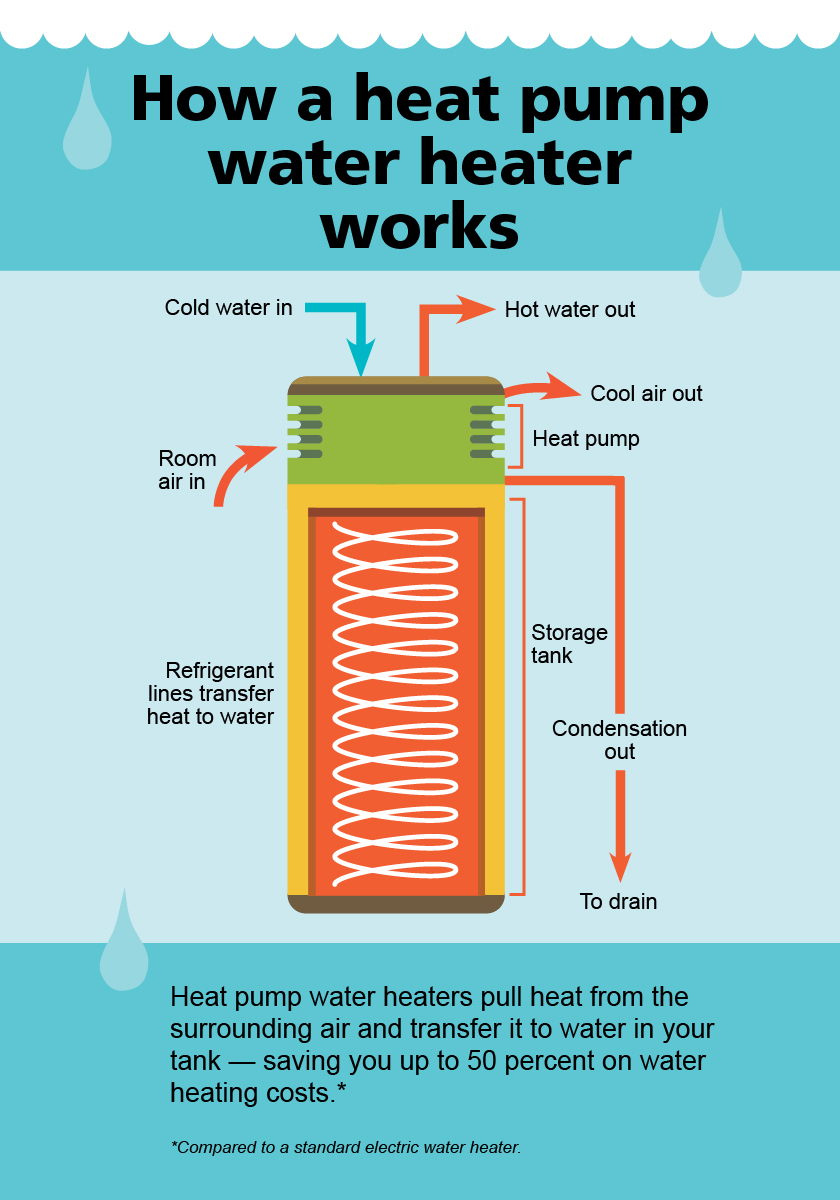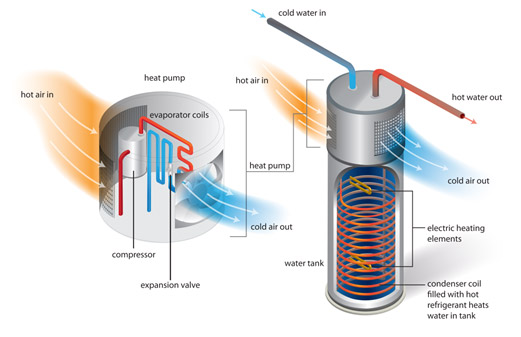A heat pump water heater moves heat, not generates it. This process makes it efficient and eco-friendly.
Many wonder how these systems function. They tap into surrounding air to heat water, using less energy than traditional heaters. This approach reduces electricity use and lowers utility bills. Understanding how heat pump water heaters work can help you make informed choices about home heating.
These systems use a refrigeration cycle, similar to air conditioners. They extract heat from ambient air, transferring it to water in the tank. This method is efficient even in colder climates, making it a versatile option. With growing energy concerns, learning about this technology can offer both environmental and financial benefits. Explore the workings of these heaters to see if they fit your home’s needs.
Introduction To Heat Pump Water Heaters
A heat pump water heater uses air to heat water. It works like a refrigerator in reverse. The heat pump pulls in warm air from its surroundings. Then it transfers this warmth to the water. This method is very energy-efficient.
These heaters use less electricity than regular water heaters. They are good for the environment. Often, they come with smart controls. These controls help save even more energy.
Heat pumps have been around for many years. In the 1970s, people started using them more. They wanted to save energy during the oil crisis. Today, they are popular in many homes. Improvements have made them more effective and affordable. They help reduce electricity bills and carbon footprint.
Core Components
The heat pump pulls heat from the air. This heat warms the water. It uses a compressor to do this. The compressor squeezes air. This makes the air hot. The hot air moves to the water. The water gets warmer. The pump uses less energy. This saves money.
The water storage tank holds the hot water. It keeps the water warm. The tank has thick walls. These walls stop heat from leaving. You get hot water when you need it. The tank can be big or small. Bigger tanks hold more water. Small tanks take up less space.
Operational Principles
A heat pump water heater moves heat from one place to another. It uses a small amount of electricity to do this. The heat is taken from the air around the unit. Then, it is moved into the water tank. This process is more efficient than using electricity to directly heat water. The key is using a refrigerant. This refrigerant absorbs heat. It is then compressed to increase temperature. Finally, the heat is released into the water.
Heat pump water heaters use ambient air as their energy source. They do not create heat themselves. Instead, they capture existing heat from the environment. This makes them more energy-efficient. Less electricity is needed compared to traditional heaters. They work best in warm areas. In cold areas, performance may be reduced. The system uses fans and compressors to move heat.

Credit: www.netzeromontpelier.org
Efficiency Factors
Heat pump water heaters use less energy than regular heaters. They are designed to be efficient. This means they use less power to heat water. Lower energy use saves money. It also helps the environment.
These heaters have a low environmental impact. They emit fewer pollutants. This makes them a cleaner choice for heating water. Less pollution means a healthier planet. Choosing them supports green living.
Comparative Analysis
A heat pump water heater absorbs heat from the air and transfers it to the water. This method makes it more energy-efficient than traditional water heaters. It uses a refrigerant and a compressor to achieve this efficient heating process.
Traditional Water Heaters Vs. Heat Pump Models
Traditional water heaters use electricity or gas to heat water directly. This can be less efficient and cost more money. Heat pump water heaters move heat from the air into the water. This process uses less energy. So it costs less money to heat water.
Heat pump models are better for saving energy. They can cut water heating costs by up to 50%. Traditional heaters are not as efficient. They often waste energy during heating.
Choosing a heat pump model can be smart. It saves money over time. It helps the environment too. Heat pumps reduce carbon footprint. Traditional models do not offer this benefit.
Heat pumps need a certain temperature range to work well. They may not be ideal for cold climates. Traditional heaters work in any climate. But they cost more in the long run.
Installation And Maintenance
Heat pump water heaters work by transferring heat from the air to the water. This process makes them energy-efficient. Regular maintenance ensures optimal performance and longevity.
Installation Requirements
Heat pump water heaters need enough space to work. The room should be at least 700 cubic feet. This is the size of a small bedroom. Proper ventilation is also key. The air around the heater should flow freely. A dedicated circuit is needed for power. This keeps the system safe. The floor must be strong. It must hold the heater’s weight. Check for sturdy ground before placing the heater. Ensure there are no leaks in pipes. This helps in smooth installation.
Routine Maintenance Tips
Keep the area around the heater clean. Dust can block airflow. Check filters every three months. Clean or replace them if dirty. Look for water leaks often. Fix leaks quickly to avoid damage. Listen for strange noises. Unusual sounds can mean trouble. Ensure all connections are tight. Loose parts can cause issues. Always follow the manual. It offers the best advice for care.
Innovations And Future Trends
Heat pump water heaters efficiently transfer heat from the air to water using electricity. This process reduces energy consumption. Expect lower bills and eco-friendly water heating solutions in homes.
Technological Advancements
Heat pump water heaters are becoming smarter. Sensors now track energy use. Remote controls adjust settings from far away. Better designs mean quieter machines. Advanced materials reduce wear and tear. Eco-friendly refrigerants are used more often. These changes help save energy. New models work faster and use less power. Smart systems learn your habits. They heat water when you need it most. Digital displays show energy use in real-time. Wi-Fi connections let you control them with your phone. These features make water heaters more efficient.
Market Growth Predictions
The market for heat pump water heaters is growing fast. Demand rises with energy costs. Many homes want efficient systems. Manufacturers are making more units. Government incentives boost sales. New homes often include these heaters. Older homes upgrade to save money. Energy savings attract buyers. Asia and Europe lead in growth. North America follows closely. Sales increase every year. Homeowners prefer eco-friendly options. The market will grow more. Investors see big opportunities. Climate change drives demand. Efficient heating is the future.
:max_bytes(150000):strip_icc()/Treehugger_Whatisaheatpumpwaterheater_colorv13-bc563d723e6c448cb9d11337ce99afc3.png)
Credit: www.treehugger.com

Credit: elephantenergy.com
Conclusion
Understanding heat pump water heaters is crucial for energy efficiency. They use less electricity, offering savings on utility bills. The process involves moving heat rather than generating it. This makes them an eco-friendly choice. Simple installation and operation add convenience.
Ideal for homes aiming to reduce carbon footprint. These heaters work well in mild climates. Always consider professional advice before purchase. Maintenance is straightforward, ensuring long-term reliability. Explore this option for an efficient water heating solution. Choose wisely for your household needs.
Make a positive impact on the environment today.
I’m Robert M. Payne, a passionate enthusiast for turning houses into dream homes. With a knack for DIY projects and a keen eye for design, I’ve dedicated myself to sharing my knowledge and experiences in the realm of home improvement.
As a seasoned homeowner and avid DIYer, I understand the challenges and joys that come with transforming living spaces. Through Myhomemyworld, I aim to inspire and guide fellow homeowners on their journey to creating spaces that reflect both functionality and style.
Cheers to creating spaces that truly feel like home.
Connect with me in facebook

